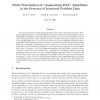Free Online Productivity Tools
i2Speak
i2Symbol
i2OCR
iTex2Img
iWeb2Print
iWeb2Shot
i2Type
iPdf2Split
iPdf2Merge
i2Bopomofo
i2Arabic
i2Style
i2Image
i2PDF
iLatex2Rtf
Sci2ools
165
click to vote
ESA
2006
Springer
2006
Springer
Finite Termination of "Augmenting Path" Algorithms in the Presence of Irrational Problem Data
This paper considers two similar graph algorithms that work by repeatedly increasing "flow" along "augmenting paths": the Ford-Fulkerson algorithm for the maximum flow problem and the Gale-Shapley algorithm for the stable allocation problem (a many-to-many generalization of the stable matching problem). Both algorithms clearly terminate when given integral input data. For real-valued input data, it was previously known that the Ford-Fulkerson algorithm runs in polynomial time if augmenting paths are chosen via breadth-first search, but that the algorithm might fail to terminate if augmenting paths are chosen in an arbitrary fashion. However, the performance of the Gale-Shapley algorithm on real-valued data was unresolved. Our main result shows that, in contrast to the Ford-Fulkerson algorithm, the Gale-Shapley algorithm always terminates in finite time on real-valued data. Although the Gale-Shapley algorithm may take exponential time in the worst case, it is a popu...
| Added | 22 Aug 2010 |
| Updated | 22 Aug 2010 |
| Type | Conference |
| Year | 2006 |
| Where | ESA |
| Authors | Brian C. Dean, Michel X. Goemans, Nicole Immorlica |
Comments (0)

